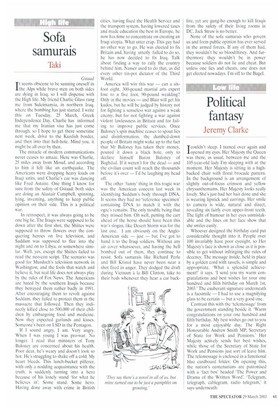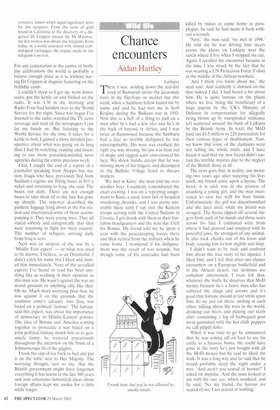Political fantasy
Jeremy Clarke
Icouldn't sleep. I turned over again and opened my eyes. Her Majesty the Queen was there, as usual, between me and the 105-year-old lady I'm sleeping with at the moment. Her Majesty is sitting in a highbacked chair with floral brocade pattern. In the background is an arrangement of slightly out-of-focus crimson and yellow chrysanthemums. Her Majesty looks really lovely. She's just had her hair done and she is wearing lipstick and earrings. Her smile to camera is wide, natural and direct, revealing six fairly even upper-front teeth. The light of humour in her eyes unmistakable and the lines on her face show that she smiles easily.
Whoever designed the birthday card put considerable thought into it. People over 100 invariably have poor eyesight. so Her Majesty's face is shown as close as it is possible to get without infringing the rules of decency. The message inside, held in place by a golden cord with tassels, is simple and appropriate. 'What a splendid achievement!' it says. 'I send you my warm congratulations and best wishes for your one hundred and fifth birthday on March 1st, 2003.' The exuberant signature underneath is a facsimile — I had to use a magnifying glass to be certain — but a very good one.
Contrast this with the 'telemessage' from the government standing beside it. 'Warm congratulations on your one hundred and fifth birthday. My best wishes go out to you for a most enjoyable day. The Right Honourable Andrew Smith MP, Secretary of State for Work and Pensions.' Her Majesty actively sends her best wishes, while those of the Secretary of State for Work and Pensions just sort of leave him. The telemessage is enclosed in a functional blue cardboard folder. On opening this, the nation's centenarians are patronised with a 'fact box' headed 'The Power and Drama of the Written Word'. 'Telegram, telegraph, cablegram, radio telegram,' it says underneath:
evocative names which signal significant news for the recipient. From the news of gold found in California to the discovery of a disguised Dr Crippen aboard the SS Montrose, the key witness was always the telegram. Even today, in a world saturated with instant technological exchanges, the impact made by the telegram is no less.
For any centenarian at the centre of birthday celebrations the world is probably a bizarre enough place as it is, without having Dr Crippen in disguise featuring on the birthday cards.
I couldn't sleep so I got up, went downstairs, put the kettle on and flicked on the radio. It was 4.30 in the morning and Radio Four had handed over to the World Service for the night. Since war began I've listened to the radio, watched the TV news coverage and read all the newspapers I can lay my hands on. But listening to the World Service for the time it takes for a kettle to boil, I gained a more detailed perspective about what was going on in Iraq than I had by watching, reading and listening to our more parochial-minded news agencies during the entire previous week.
First, I caught the end of a report of a journalist speaking from Aleppo bus station. Iraqis who have previously fled from Saddam's regime are filling buses at $15 a ticket and returning to Iraq, she said. The buses run daily. There are not enough buses to take them all so the fare has gone up sharply. The reporter described the pathetic luggage lying about at the bus station and interviewed some of those accompanying it. They were young men. They all stated soberly and categorically that they were returning to fight for their country. The number of refugees arriving daily from Iraq is zero.
Next was an analysis of the war by a 'Middle East expert' — or what was used to be known, I believe, as an Orientalist. I didn't catch his name but I liked and trusted him immediately. None of the so-called experts I've heard or read has been anything like as scathing in their opinions as this man was, He wasn't against the war on moral grounds or anything silly like that. Oh no. Much more worrying than that, he was against it on the grounds that the coalition army's advance into Iraq was based on a political 'fantasy'. The fantasy, said this expert, was about the importance of democracy in Middle-Eastern politics. The idea of Britain and America coming together to prosecute a war based on a joint political fantasy struck him as so genuinely funny, he teetered precariously throughout the interview on the brink of a Johnsonesque fit of the giggles.
I took the cup of tea back to bed and put it on the table next to Her Majesty. The worrying thought, new to me, that the British government might have forgotten everything it has learnt in the last 300 years and now entertains fantastical ideas about foreign affairs kept me awake for a little while longer.









































































 Previous page
Previous page